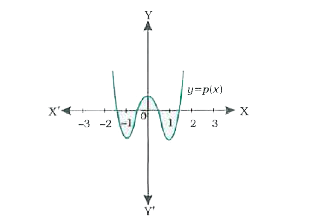Answer each question by selecting the proper alternative from those given below each question so as to make the statement true :
The quadratic polynomial whose sum and product of zeroes are −3 and 2 respectively is………..Solution in Gujrati
x2+3x+2
x2−3x−2
x2+2x+3
x2−2x−3
The correct Answer is:A
Step by step video, text & image solution for Answer each question by selecting the proper alternative from those given below each question so as to make the statement true : The quadratic polynomial whose sum and product of zeroes are -3 and 2 respectively is……….. by Maths experts to help you in doubts & scoring excellent marks in Class 10 exams.
Topper's Solved these Questions
- BOOK - KUMAR PRAKASHANCHAPTER - POLYNOMIALSEXERCISE - PRACTICE THOROUGHLY20videos
POLYNOMIALS
- BOOK - KUMAR PRAKASHANCHAPTER - PAIR OF LINEAR EQUATIONS IN TWO VARIABLES EXERCISE - Test Your Skills48videos
PAIR OF LINEAR EQUATIONS IN TWO VARIABLES
- BOOK - KUMAR PRAKASHANCHAPTER - PROBABILITY EXERCISE - OBJECTIVE QUESTIONS (State whether each of the following statements is true or false:)5videos
PROBABILITY
Similar Questions
Find the zeroes of the following quadratic polynomials by factorisation method and verify the relationship between the zeroes and the coefficients of the polynomial :
x2−7x+1202:29View SolutionIf the numerator of a fraction is decreased by 1. It reduces to 12 and if its numerator is increased by 1. it reduces to 1. Represent this situation algebraically and graphically.
02:03View SolutionFor any event A, P (A) is always greater than P(¯¯¯A).
01:53View SolutionAnswer each question by selecting the proper alternative from those given below each question so as to make the statement true :
The number of zeroes lying between −1 and 1 of the polynomial p(x), whose graph is given, is…………
 01:58View Solution
01:58View SolutionAnswer each question by selecting the proper alternative from those given below each question so as to make the statement true :
The quadratic polynomial for which the sum and product of zeroes are 4 and 4 respectively is……….02:11View SolutionAnswer each question by selecting the proper alternative from those given below each question so as to make the statement true :
The quadratic polynomial with zeroes 5 and 3 is………..03:45View SolutionAnswer each question by selecting the proper alternative from those given below each question so as to make the statement true :
The zeroes of the polynomial x2+2x−15 are……….02:33View SolutionAnswer each question by selecting the proper alternative from those given below each question so as to make the statement true :
For the cubic polynomial p(x)=x3−x2−17x−15, the sum of the products of zeroes taken two at a time is……….01:52View SolutionAnswer each question by selecting the proper alternative from those given below each question so as to make the statement true :
The zeroes of polynomial x2+99x+127 are…………01:55View SolutionAnswer each question by selecting the proper alternative from those given below each question so as to make each statement true :
The sum of the first n terms of the AP √2,√8,√18,√32 ......is .......01:59View SolutionAnswer each question by selecting the proper alternative from those given below each question so as to make each statement true :
If the nth term of AP is 2n +1 , then the sum of first n terms of the AP is ..........01:45View SolutionAnswer each question by selecting the proper alternative from those given below each question so as to make each statement true :
If k + 2, 4k - 6, 3k - 2 are three consecutive terms of an AP, then k = ..........05:32View SolutionAnswer each question by selecting the proper alternative from those given below each question so as to make each statement true :
The sum of first n terms of the AP a, 3a,5a,......is .......01:08View SolutionAnswer each question by selecting the proper alternative from those given below each question so as to make each statement true :
The opposite angles of a parallelogram are ………….00:38View SolutionAnswer each question by selecting the proper alternative from those given below each question so as to make each statement true :
The area of an equilateral triangle =………..02:27View Solution

